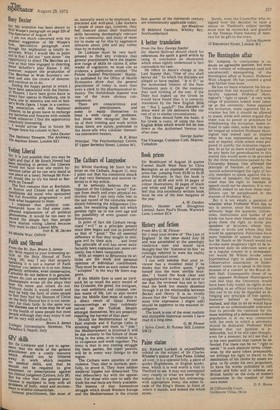The Huntingdon affair
Sir: Jumping to conclusions is no doubt an agreeable pastime, but even in the context of widespread (and still uncorrected) misreporting of the Huntington affair at Sussex, Professor Watt (August 18) has jumped a good deal farther than most
He has no basis whatever for his assumption that the majority of Sussex faculty opposed Professor Huntington's " right to speak." A very wide range of positions indeed were taken up at the university, Some opposed the invitation, some regretted the invitation but felt it should be allowed to stand, while still others argued that there was no power or procedure for withdrawing the invitation. Some refused to take sides, some felt the matter hinged on whether Professor Huntington had indeed said or implied what he was represented as having said or implied, while others were prepared to justify the invitation regardless. In so far as there would appear to be any basis for generalisation in this matter this would seem to be provided by the three resolutions passed by the University Senate. One affirmed the principle of freedom of speech; the second acknowledged the right of faculty members to speak against the invitation of speakers; the third recognised that the right to freedom of speech could not be absolute. It is very difficult indeed to see how these resolutions can be paraphrased in the manner of Professor Watt.
But it is not simply a question of whether what Professor Watt has to say is untrue, since his formulation seriously begs the question. Universities, institutions and bodies of all kinds too have their freedom, and this gives them the right to invite any speakers or lecturers whom they choose to invite and whom they feel would be appropriate. Politicians have more freedom of speech than most: but Mr Heath or Mr Powell would not invoke some imaginary right to be interviewed daily on television news or to a regular column in a newspaper; nor would Mr Wilson invoke some hypothetical right to address a local Conservative association, or boilermakers' union or to speak in the intermission of a concert at the Royal Albert Hall. Consequently those of us who opposed Professor Huntington's visit feel that the University would have been fully within its rights in not acceding to an official invitation, that this can in no way be regarded as infringing any principle of free speech, however defined or imperfectly realised, and that to do so would have served as an unmistakeable indication that to provide the rationale for the mass bombing of a defenceless civilian population is in no way connected
with the ends to which a university should be dedicated. Professor Watt believes that our position is indefensible, but if he will take thought, even for a moment, he will see that it is his own position that cannot be defended, For there can be no "right to speak" in such absolute terms. Other wise, by the same token presumably, we infringe his right to travel to the destination of his choice by steam en gine, to fly under his own propulsion, to have his works published in calf, vellum and folio and to address any British family on the evils of modern universities in the comfort of their own home' D. P. Morse 20 Cliftonville Court, Goldstone Villas, Hove


































 Previous page
Previous page